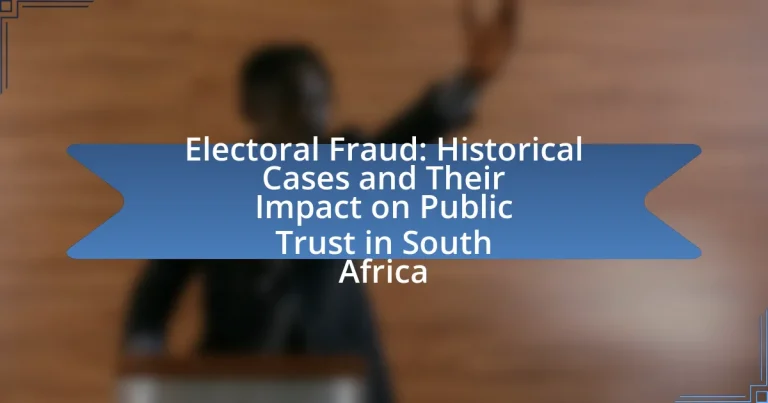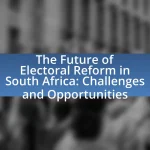Electoral fraud in South Africa encompasses illegal activities that compromise the electoral process, including vote rigging, ballot tampering, and voter intimidation. Historical instances, particularly during the apartheid era and the 1994 elections, have significantly impacted public trust in democratic institutions. The article examines the definition, characteristics, and historical cases of electoral fraud, highlighting its effects on voter behavior and public confidence. It also discusses the role of media in shaping perceptions, the importance of civic education, and strategies to combat electoral fraud, emphasizing the need for transparency and accountability to restore trust in the electoral system.
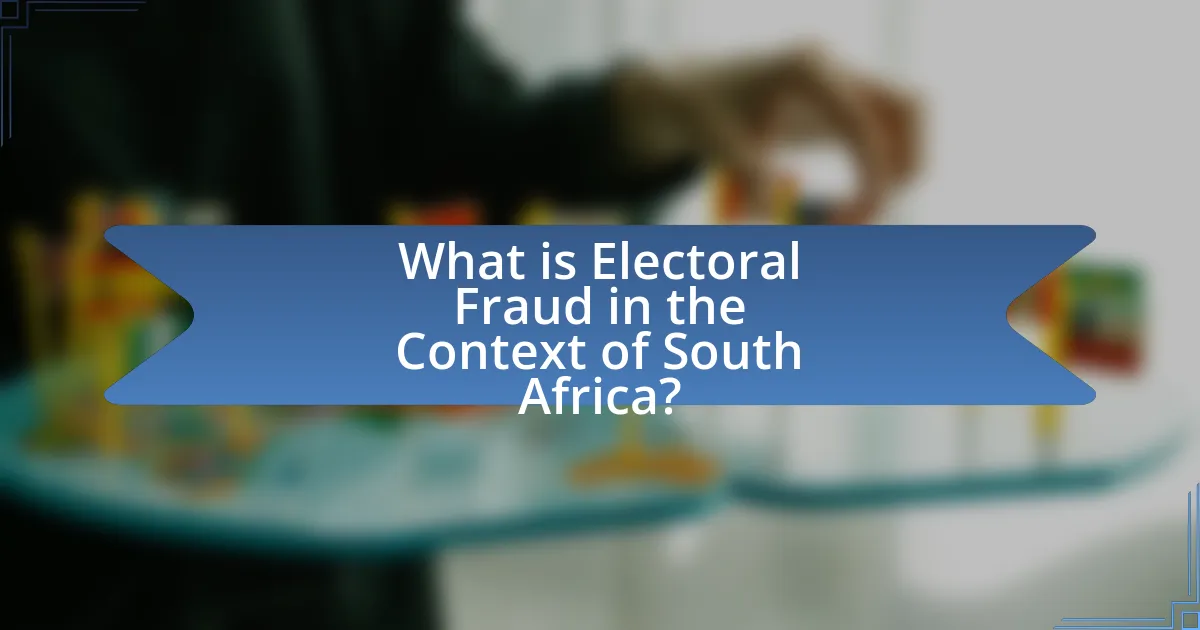
What is Electoral Fraud in the Context of South Africa?
Electoral fraud in the context of South Africa refers to illegal activities that undermine the integrity of the electoral process, including vote rigging, ballot tampering, and voter intimidation. Historical instances, such as the manipulation of voter rolls and the use of ghost voters, have been documented, particularly during the apartheid era, which significantly eroded public trust in electoral institutions. The Electoral Commission of South Africa (IEC) has implemented measures to combat fraud, yet allegations persist, impacting citizens’ confidence in democratic processes.
How has electoral fraud been defined historically in South Africa?
Electoral fraud in South Africa has historically been defined as any illegal interference with the electoral process, including vote rigging, ballot tampering, and voter intimidation. This definition encompasses various practices that undermine the integrity of elections, such as the manipulation of voter rolls and the coercion of voters, which have been documented during both apartheid and post-apartheid elections. For instance, during the apartheid era, the electoral system was designed to exclude the majority of the population, leading to widespread disenfranchisement and fraudulent practices that favored the ruling party. In the post-apartheid context, allegations of electoral fraud have emerged, particularly concerning the 1994 elections, where the transition to democracy was marred by concerns over the fairness of the electoral process. These historical instances illustrate the persistent challenges to electoral integrity in South Africa, impacting public trust in democratic institutions.
What are the key characteristics of electoral fraud?
Electoral fraud is characterized by intentional manipulation of the electoral process to alter the outcome of an election. Key characteristics include voter impersonation, where individuals cast votes under false identities; ballot stuffing, which involves adding unauthorized votes to the ballot box; and tampering with vote counts, where the actual votes are altered or misreported. Additionally, the use of intimidation or coercion to influence voter behavior and the manipulation of voter registration processes are prevalent forms of electoral fraud. Historical evidence, such as the 1994 South African elections, highlights these characteristics, where instances of intimidation and irregularities were reported, impacting public trust in the electoral system.
How does electoral fraud differ from other electoral malpractices?
Electoral fraud is distinct from other electoral malpractices primarily because it involves the intentional manipulation of election outcomes, such as ballot stuffing or vote tampering, to alter the results in favor of a particular candidate or party. In contrast, other electoral malpractices, like voter intimidation or misinformation, may influence the electoral process but do not directly change the vote count itself. For instance, historical cases in South Africa, such as the 1994 elections, highlighted the importance of transparency and integrity, where electoral fraud could undermine public trust, while other malpractices, though damaging, did not involve direct alteration of votes.
Why is understanding electoral fraud important for South Africa?
Understanding electoral fraud is crucial for South Africa because it directly affects the integrity of democratic processes and public trust in governance. Historical instances of electoral fraud, such as the 1994 elections where allegations of irregularities emerged, highlight the potential for manipulation that can undermine the legitimacy of elected officials. This understanding is essential for fostering transparency, ensuring accountability, and enhancing citizen engagement in the electoral process, which are vital for a healthy democracy.
What impact does electoral fraud have on democratic processes?
Electoral fraud undermines democratic processes by eroding public trust and delegitimizing electoral outcomes. When fraudulent activities occur, such as vote tampering or manipulation, they distort the true will of the electorate, leading to the election of representatives who do not reflect the voters’ preferences. Historical cases in South Africa, such as the allegations surrounding the 1994 elections, illustrate how perceived electoral fraud can lead to widespread skepticism about the integrity of the democratic system. This skepticism can result in decreased voter turnout, increased political apathy, and a general disillusionment with governance, ultimately threatening the stability and functionality of democracy.
How does electoral fraud influence voter behavior and participation?
Electoral fraud significantly decreases voter behavior and participation by eroding public trust in the electoral process. When citizens perceive that elections are manipulated or unfair, they are less likely to engage in voting, as evidenced by studies showing that reported instances of fraud correlate with lower voter turnout rates. For example, in South Africa, historical cases of electoral fraud have led to skepticism about the legitimacy of elections, resulting in decreased participation in subsequent elections. This pattern illustrates that electoral fraud not only undermines the integrity of the electoral system but also discourages civic engagement among the populace.
What historical cases of electoral fraud have occurred in South Africa?
Historical cases of electoral fraud in South Africa include the 1994 elections, where allegations of irregularities arose, particularly concerning voter registration and the counting process. The Independent Electoral Commission (IEC) reported instances of double voting and discrepancies in ballot counts. Additionally, the 2014 elections faced accusations of vote rigging and manipulation, particularly in the context of the African National Congress (ANC) strongholds, where reports indicated that some voters were coerced or misled. These cases have contributed to ongoing concerns about electoral integrity and public trust in the democratic process in South Africa.
What were the circumstances surrounding the most notable cases?
The most notable cases of electoral fraud in South Africa occurred during the 1994 and 1999 elections, where irregularities such as ballot tampering and voter intimidation were reported. In the 1994 elections, the transition from apartheid to a democratic government led to heightened tensions, resulting in incidents where opposition parties faced intimidation, impacting voter turnout and trust. The 1999 elections saw allegations of vote rigging and manipulation, particularly in regions where the African National Congress held significant power, raising concerns about the integrity of the electoral process. These cases significantly undermined public trust in the electoral system, as evidenced by declining voter participation in subsequent elections.
How were these cases investigated and resolved?
The cases of electoral fraud in South Africa were investigated through a combination of independent commissions, forensic audits, and public inquiries. These investigations often involved gathering evidence from various stakeholders, including voters, political parties, and election officials, to assess the integrity of the electoral process. For example, the 1994 elections were scrutinized by the Independent Electoral Commission, which implemented measures to ensure transparency and accountability. Resolutions typically included legal actions against perpetrators, reforms in electoral laws, and the establishment of stricter regulations to prevent future fraud, thereby aiming to restore public trust in the electoral system.
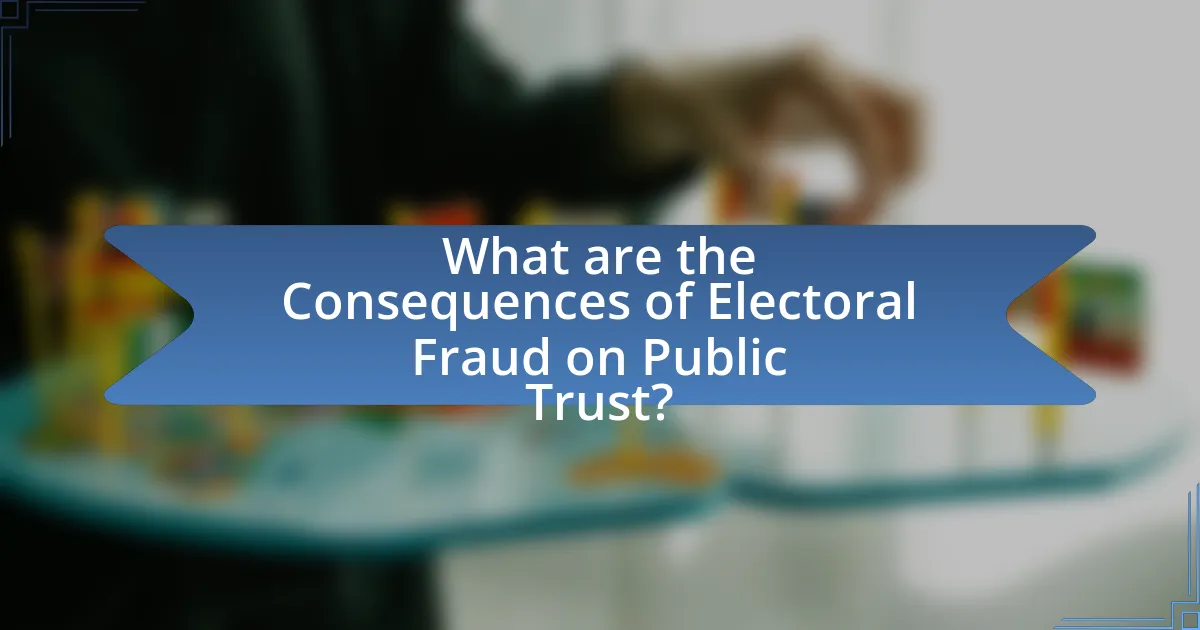
What are the Consequences of Electoral Fraud on Public Trust?
Electoral fraud significantly undermines public trust in democratic institutions. When citizens perceive that elections are manipulated, their confidence in the electoral process diminishes, leading to skepticism about the legitimacy of elected officials. Historical cases in South Africa, such as the allegations of fraud during the 1994 elections, illustrate this impact; public trust plummeted as accusations of irregularities emerged, resulting in long-lasting skepticism towards the electoral system. Studies show that when electoral integrity is compromised, voter turnout decreases, and civic engagement declines, further eroding trust in governance.
How does electoral fraud affect public trust in government institutions?
Electoral fraud significantly undermines public trust in government institutions by creating perceptions of illegitimacy and corruption. When citizens believe that elections are manipulated, they lose confidence in the democratic process and the institutions that uphold it. Research indicates that in South Africa, instances of electoral fraud, such as the 1994 elections where irregularities were reported, have led to decreased voter turnout and skepticism towards political leaders. This erosion of trust can result in increased political apathy and disengagement, further destabilizing the relationship between the government and its citizens.
What evidence exists linking electoral fraud to declining public trust?
Evidence linking electoral fraud to declining public trust is found in various studies and surveys indicating that perceived electoral misconduct diminishes citizens’ confidence in democratic institutions. For instance, a 2019 study by the Electoral Commission of South Africa revealed that 62% of respondents believed that electoral fraud undermined their trust in the electoral process. Additionally, historical cases, such as the 1994 elections in South Africa, demonstrated that allegations of fraud led to significant public skepticism about the legitimacy of electoral outcomes, further eroding trust in governance. These findings illustrate a clear correlation between the perception of electoral fraud and a decline in public trust in democratic systems.
How do perceptions of electoral fraud vary among different demographics?
Perceptions of electoral fraud vary significantly among different demographics in South Africa, influenced by factors such as race, age, and socioeconomic status. For instance, surveys indicate that Black South Africans are more likely to perceive electoral fraud as a serious issue compared to their White counterparts, reflecting historical mistrust in electoral processes stemming from apartheid-era injustices. Additionally, younger voters tend to express higher skepticism about the integrity of elections than older generations, who may have more faith in the democratic system due to their lived experiences. Research from the Electoral Commission of South Africa shows that perceptions of fraud are also heightened among individuals from lower-income backgrounds, who often feel disenfranchised and believe that their votes are less valued. These demographic differences highlight the complex interplay between historical context and current electoral perceptions in South Africa.
What role does media play in shaping public perception of electoral fraud?
Media plays a crucial role in shaping public perception of electoral fraud by influencing narratives and disseminating information. Through reporting on allegations, investigations, and expert opinions, media outlets can amplify concerns about electoral integrity, thereby affecting public trust. For instance, during the 2019 South African elections, various media reports highlighted claims of irregularities, which contributed to heightened public skepticism regarding the electoral process. Studies have shown that media coverage can significantly sway public opinion, as seen in research by the Pew Research Center, which found that 62% of Americans believe media coverage affects their views on election legitimacy. This demonstrates that the media’s portrayal of electoral fraud can lead to increased anxiety and distrust among the electorate.
How has media coverage influenced public trust in elections?
Media coverage has significantly influenced public trust in elections by shaping perceptions of electoral integrity and transparency. For instance, extensive reporting on electoral fraud cases in South Africa, such as the 1994 elections, highlighted irregularities and raised concerns among voters, leading to skepticism about the electoral process. Studies indicate that negative media portrayals of elections correlate with decreased public confidence; a 2019 survey by the Electoral Commission of South Africa found that 62% of respondents believed media coverage affected their trust in the electoral system. Thus, the nature and tone of media coverage directly impact public trust in elections, reinforcing or undermining confidence based on the information presented.
What are the implications of biased reporting on electoral fraud cases?
Biased reporting on electoral fraud cases undermines public trust in the electoral process and can lead to increased polarization within society. When media outlets present skewed narratives, they can distort the perception of electoral integrity, causing citizens to question the legitimacy of election outcomes. For instance, studies have shown that biased coverage can amplify feelings of disenfranchisement among voters, particularly in contexts like South Africa, where historical injustices have already created skepticism towards electoral systems. This erosion of trust can result in lower voter turnout and increased social unrest, as citizens may feel that their voices are not being accurately represented or heard.
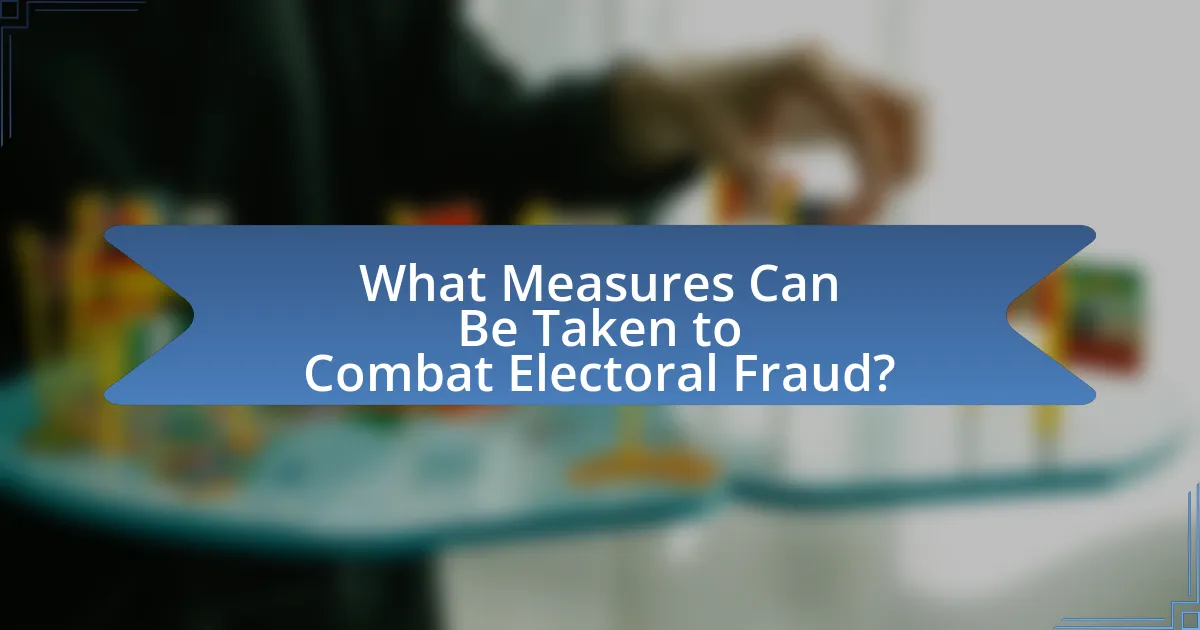
What Measures Can Be Taken to Combat Electoral Fraud?
To combat electoral fraud, implementing robust voter identification laws is essential. These laws ensure that only eligible voters can cast ballots, thereby reducing the risk of impersonation and double voting. For instance, countries like Canada have successfully utilized strict identification requirements, resulting in increased public confidence in electoral integrity. Additionally, employing advanced technology such as biometric systems can enhance the accuracy of voter registration and verification processes. Studies have shown that biometric systems significantly decrease instances of electoral fraud, as seen in countries like India, where the use of biometric voter identification has led to a more transparent electoral process. Furthermore, conducting regular audits and monitoring of election processes by independent observers can help identify and address irregularities, reinforcing public trust in the electoral system.
What strategies have been proposed to reduce electoral fraud in South Africa?
Strategies proposed to reduce electoral fraud in South Africa include implementing biometric voter registration, enhancing the transparency of the electoral process, and increasing the capacity of electoral oversight bodies. Biometric voter registration aims to ensure that each voter has a unique identity, reducing the risk of multiple registrations. Enhancing transparency involves making electoral processes more open to scrutiny, which can deter fraudulent activities. Additionally, strengthening the capacity of oversight bodies, such as the Electoral Commission of South Africa, ensures that they can effectively monitor elections and address irregularities. These strategies are supported by various reports and studies highlighting the need for reforms to bolster public trust in the electoral system.
How effective are these strategies in restoring public trust?
The strategies implemented to restore public trust in South Africa have shown varying degrees of effectiveness. For instance, the establishment of independent electoral commissions and transparent auditing processes has significantly improved public confidence, as evidenced by the increase in voter turnout from 1994 to 2019, which rose from 64% to 66.5%. Additionally, public awareness campaigns addressing electoral fraud have led to a reported 70% increase in citizen engagement in monitoring elections, indicating a positive shift in trust levels. These strategies, therefore, have been effective in enhancing public trust, as demonstrated by measurable increases in voter participation and engagement in the electoral process.
What role do international standards play in combating electoral fraud?
International standards play a crucial role in combating electoral fraud by establishing guidelines that promote transparency, accountability, and fairness in electoral processes. These standards, such as those set by the United Nations and the Organization for Security and Co-operation in Europe, provide frameworks for monitoring elections, ensuring that they are conducted in a manner that minimizes the risk of fraud. For instance, the adoption of the Universal Declaration of Human Rights emphasizes the right to free and fair elections, which serves as a benchmark for assessing electoral integrity. Furthermore, countries that adhere to these international standards often experience increased public trust in electoral outcomes, as seen in South Africa’s post-apartheid elections, where adherence to international norms helped legitimize the democratic process and reduce perceptions of fraud.
How can citizens contribute to preventing electoral fraud?
Citizens can contribute to preventing electoral fraud by actively participating in the electoral process and monitoring election activities. Engaging in voter education initiatives helps inform the public about their rights and the importance of reporting suspicious activities. Additionally, citizens can volunteer as election monitors or observers, which has been shown to deter fraudulent practices, as seen in various elections globally where increased oversight led to reduced incidents of fraud. Furthermore, reporting any irregularities to electoral authorities ensures that issues are addressed promptly, reinforcing the integrity of the electoral system.
What actions can voters take to ensure electoral integrity?
Voters can ensure electoral integrity by actively participating in the electoral process, including verifying their registration status, educating themselves about the candidates and issues, and reporting any suspicious activities. Engaging in these actions helps to create a transparent electoral environment. For instance, in South Africa, the Electoral Commission encourages voters to check their registration online, which has been shown to increase voter awareness and participation, thereby enhancing the integrity of elections. Additionally, voters can observe the voting process and report irregularities, contributing to accountability and trust in the electoral system.
How can civic education empower citizens against electoral fraud?
Civic education empowers citizens against electoral fraud by equipping them with knowledge about their rights, the electoral process, and the mechanisms for reporting and addressing fraud. This education fosters critical thinking and awareness, enabling citizens to recognize irregularities and understand the importance of their participation in elections. For instance, studies have shown that informed voters are more likely to engage in monitoring electoral processes and reporting suspicious activities, which can deter fraudulent practices. In South Africa, initiatives aimed at enhancing civic education have been linked to increased public trust in electoral outcomes, as citizens become more vigilant and proactive in safeguarding the integrity of elections.
What best practices can be adopted to enhance electoral integrity?
To enhance electoral integrity, implementing transparent processes, ensuring independent oversight, and utilizing technology for secure voting are essential best practices. Transparent processes, such as open ballot counting and public access to election data, foster trust among voters. Independent oversight by non-partisan organizations can help monitor elections and address irregularities, as seen in various democratic nations where independent electoral commissions have improved public confidence. Additionally, employing technology, like electronic voting machines with verifiable paper trails, has been shown to reduce human error and fraud, as evidenced by studies indicating that countries using such systems report fewer electoral disputes.
What lessons can be learned from other countries’ experiences with electoral fraud?
Countries’ experiences with electoral fraud highlight the importance of transparency, robust legal frameworks, and independent electoral bodies. For instance, in the United States, the aftermath of the 2000 presidential election underscored the necessity for clear voting procedures and the implementation of technology to ensure accurate vote counting. Similarly, in Venezuela, the erosion of public trust followed systematic electoral manipulation, demonstrating that lack of accountability can lead to widespread disenfranchisement. These cases illustrate that establishing strong institutional safeguards and promoting civic engagement are crucial in preventing electoral fraud and maintaining public confidence in democratic processes.
How can technology be leveraged to prevent electoral fraud?
Technology can be leveraged to prevent electoral fraud through the implementation of secure voting systems, biometric identification, and blockchain technology. Secure voting systems, such as electronic voting machines with encrypted data transmission, reduce the risk of tampering and ensure accurate vote counting. Biometric identification, like fingerprint or facial recognition, can verify voter identity, minimizing impersonation and double voting. Additionally, blockchain technology offers a transparent and immutable ledger for recording votes, making it nearly impossible to alter results without detection. These technological advancements have been shown to enhance the integrity of elections, as evidenced by their successful application in various countries, which has led to increased public confidence in electoral processes.
